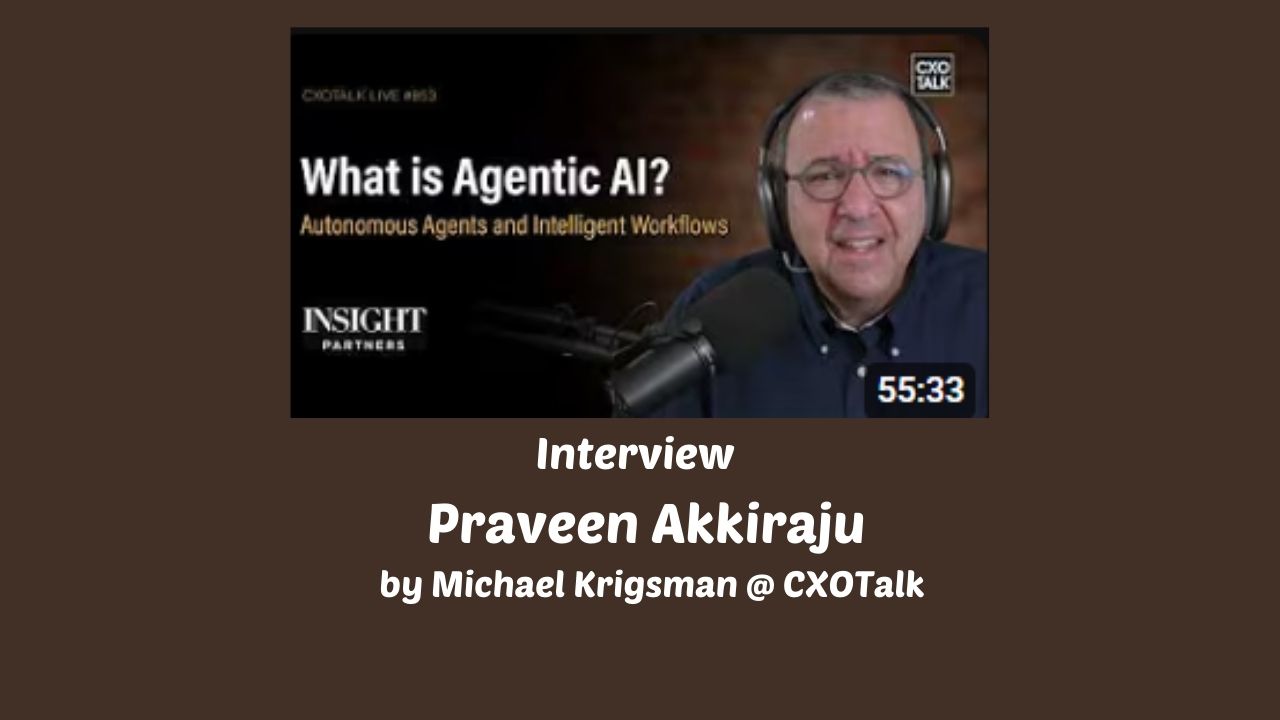
Praveen Akkiraju w/ Michael Krigsman @ CXOTalk - 853#
If you are interested in learning more about agentic AI, or you have any of these questions then without answer of fuzzy answer then this interview is for you.
Interview Questions#
- What is agentic AI? Please give us a background of AI as it relates to this and why agentic AI has suddenly erupted in popularity recently.
- When we talk about agentic AI, agents, intelligent tasks, and intelligent workflows, what are we discussing?
- How is this different from horrible chatbots that enterprise software companies sell as “great customer experience”?
- When we talk about autonomous, can you elaborate on that? To some degree, that term separates agentic AI from traditional chatbots.
- Is the reasoning step the crucial aspect that distinguishes agents from other types of computer science problems or applications?
- Can we call these AI agents instead of trying to make up a new word?
- What percentage of agentic work is focused on enterprise back-office processes? Is it more fruitful than front-end human interaction tasks?
- In the current generation, are the agentic AI layers all based on neural networks or LLM models, or are some of them more traditional symbolic AI kinds of code?
- Won’t these agents replace white-collar jobs also? Are these agents the death of consultants?
- What are the potential harms that may come from automating decision-making using agentic AI at scale?
- Can you describe how we create agents and maybe some of the companies out there who are working on this?
- Can you talk about the right type of data that needs to be collected to implement these agents?
- Should the agents be transparent on how they came to their conclusions?
- Can you help technology leaders see through the agentic hype? When evaluating these technologies, what should they look for?
- How do you ensure that agentic AI doesn’t go off the rails over time?
- Do enterprise business architects have a role in AI, and should they report directly to the CEO?
- Are these agents solely focused on optimizing tasks, or do they incorporate guardrails in their design?
- What is the ultimate goal of these agents? Is it to replace people? Should employees train these agents so they won’t have a job anymore?
- What types of jobs are most likely to be replaced by agentic AI, and which jobs will be augmented instead?
- How do models like GPT-o1 and Google’s self-correcting reinforcement learning improve reasoning and planning for agentic AI?
- How do concepts like chain-of-thought reasoning and reflection loops contribute to improving agentic AI?
- What specific applications or use cases highlight the strengths of agentic AI in enterprise settings?
- What are the challenges associated with trust and safety in deploying agentic AI at scale?
- How do AI agents differ from traditional applications or systems of record in terms of architecture and functionality?
- What role does the data layer play in enabling the functionality and accuracy of agentic AI?
- How does RAG (Retrieval Augmented Generation) help enhance model performance without retraining?
- What are the benefits and trade-offs of using open-source frameworks like LangChain or BabyAGI for building agentic AI?
- How do enterprises balance non-deterministic outputs from LLMs with the need for deterministic outcomes in applications?
Full Interview - What is Agentic AI? Autonomous Agents and Intelligent Workflows


Comments: